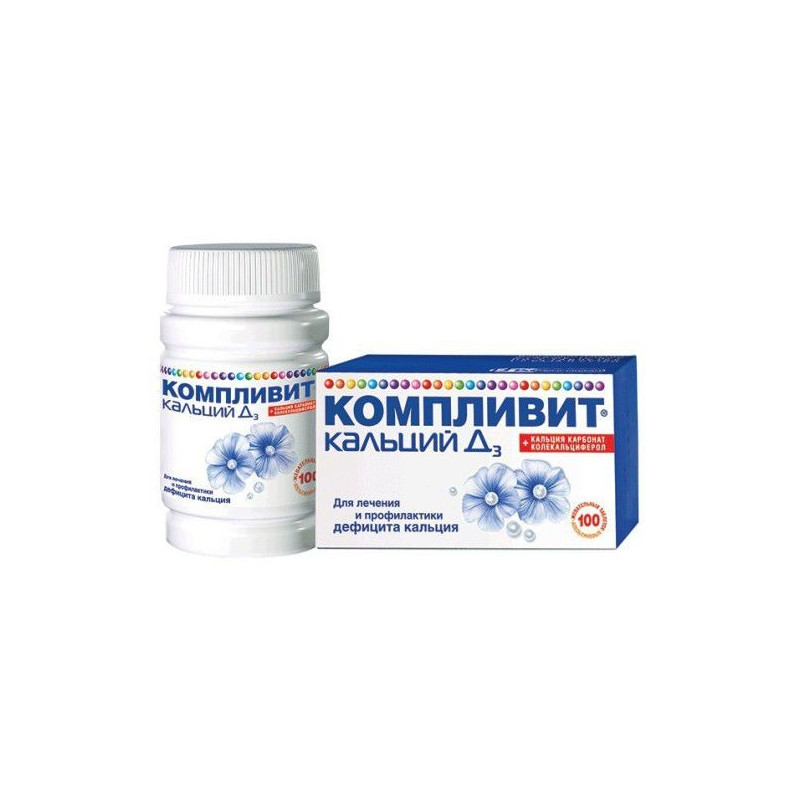



 All payments are encrypted via SSL
All payments are encrypted via SSL
 Full Refund if you haven't received your order
Full Refund if you haven't received your order
- prevention and complex therapy of osteoporosis (menopausal, senile, steroid, idiopathic);
- prevention and treatment of Calcium deficiency and / or vitamin D3.
The drug should be taken orally, preferably with meals.
For adults at osteoporosis treatment appoint 1 tab. 2-3 times / day, for osteoporosis prevention - 1 tab. 2 times / day.
With calcium deficiency and vitamin D3 adults and children over 12 years old appoint 1 tab. 1-2 times / day; children from 5 to 12 years - 1-2 tab. / Day; children from 3 to 5 years The dose is determined by the doctor individually.
Tablets chewed or swallowed whole.
Gastrointestinal: dyspeptic reactions (constipation, flatulence, nausea, stomach pain, diarrhea).
Metabolism: hypercalcemia, hypercalciuria.
Other: allergic reactions.
- hypercalcemia;
- hypercalciuria;
- calcium nephrolourithiasis;
- hypervitaminosis D;
- decalcification tumors (myeloma, bone metastases, sarcoidosis);
- osteoporosis due to immobilization;
- Phenylketonuria (contains aspartame);
- pulmonary tuberculosis (active form);
- chronic renal failure;
- children's age up to 3 years;
- hypersensitivity to the drug.
Use during pregnancy and lactation
The drug should be used with caution during pregnancy and lactation (breastfeeding).
During pregnancy, the daily dose should not exceed 1500 mg of calcium and 600 IU of vitamin D3.
Vitamin D and its metabolites can be excreted in breast milk.
Overdose during pregnancy can lead to impaired mental and physical development of the child.
Application for violations of kidney function
The drug is contraindicated in chronic renal failure.
Contraindications: children up to 3 years.
Complite® Calcium D3 contains aspartame, which in the body is transformed into phenylalanine, so the drug should not be prescribed to patients suffering from phenylketonuria.
During treatment, it is necessary to constantly monitor the excretion of calcium in the urine and the concentration of calcium and creatinine in the blood plasma. If calciuria occurs in excess of 7.5 mmol / day (300 mg / day), it is necessary to reduce the dose or stop taking the drug.
In older people, the need for calcium is 1500 mg / day, in colecalciferol - 500-1000 IU / day.
In order to avoid overdose, it is necessary to consider the additional intake of colecalciferol from other sources.
Symptoms: thirst, polyuria, loss of appetite, nausea, vomiting, constipation, dizziness, weakness, headache, fainting, coma; with prolonged use - calcification of blood vessels and tissues; laboratory indicators - hypercalciuria, hypercalcemia (plasma calcium about 2.6 mmol).
Treatment: rehydration, "loop" diuretics, GCS, calcitonin, bisphosphonates, calcium-restricted diet, hemodialysis.
In case of overdose symptoms, the patient should consult a doctor.
The activity of colecalciferol may decrease with its simultaneous use with phenytoin or barbiturates.
With simultaneous treatment with cardiac glycosides, ECG and clinical monitoring is necessary, since Calcium preparations can potentiate the therapeutic and toxic effects of cardiac glycosides.
Calcium and colecalciferol preparations can increase the absorption of tetracyclines from the gastrointestinal tract. Therefore, the time interval between taking the drugs should be at least 3 hours.
To prevent a decrease in the absorption of bisphosphonates or sodium fluoride, it is recommended to take Complivit ® Calcium D3 no earlier than two hours after their intake.
Corticosteroids reduce absorption, therefore, in the treatment of corticosteroids may require an increase in the dose of Complivit® Calcium D3.
Simultaneous treatment with Kolestiramine preparations or laxatives based on mineral or vegetable oil may reduce absorption of coralciferol.
With the simultaneous use of thiazide diuretics increases the risk of hypercalcemia, because they increase tubular calcium reabsorption. Furosemide and other "loopback" diuretics, on the contrary, increase calcium excretion by the kidneys.
Pharmacy sales terms
The drug is approved for use as a means of OTC.
Terms and conditions of storage
The drug should be stored out of the reach of children, dry, protected from light, at a temperature not exceeding 25 ° C.
